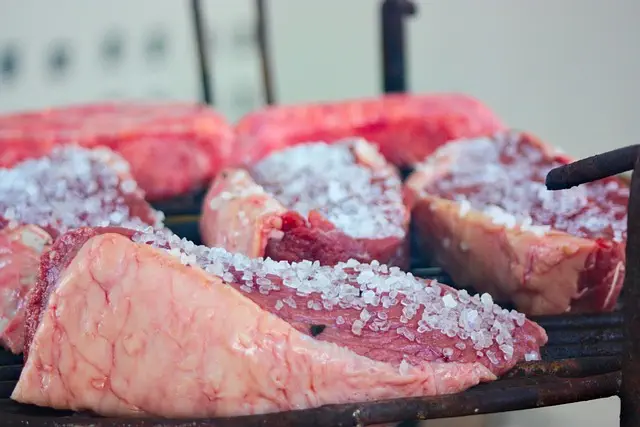Kratom manufacturers are essential to public health, adhering strictly to Good Manufacturing Practices (GMP) to ensure product quality and consumer safety. Compliance with GMP is critical given the rising popularity of Kratom and its potential effects on health. Manufacturers must meticulously document all processes, enforce quality control measures, and train staff in GMP protocols to prevent contamination and confirm each batch meets high-quality standards. This commitment to GMP is an ongoing process involving self-assessment, continuous improvement, and risk management. By maintaining GMP compliance, manufacturers not only protect public health but also gain consumer trust and establish their brand as a leader in quality within the Kratom market. The regulatory landscape is complex, with the FDA dictating strict adherence to GMP for dietary supplements, necessitating detailed Standard Operating Procedures (SOPs) and ongoing staff training. To navigate these regulations effectively, collaboration with specialized regulatory consultants is highly recommended. Kratom manufacturers who uphold these standards demonstrate due diligence, build consumer confidence, and maintain product integrity that aligns with the highest industry benchmarks. The article emphasizes the critical role of GMP in ensuring the safety and efficacy of kratom products, which is paramount for the industry's success and reputation.
Navigating the stringent requirements of Good Manufacturing Practice (GMP) compliance is a cornerstone for any reputable kratom manufacturer aiming to produce safe and efficacious products. This article delves into the critical aspects of GMP compliance within the kratom industry, offering an in-depth overview of the necessary steps and best practices that manufacturers must adhere to ensure regulatory compliance. From understanding the intricate details of the regulatory landscape to implementing robust production protocols, this guide is tailored to assist kratom producers in maintaining the highest standards of GMP compliance.
- Ensuring GMP Compliance: A Critical Overview for Kratom Manufacturers
- Navigating the Regulatory Landscape: Key Steps for Kratom Manufacturer GMP Adherence
- Best Practices in Production: Maintaining GMP Standards for Kratom Products
Ensuring GMP Compliance: A Critical Overview for Kratom Manufacturers

Kratom manufacturers are tasked with adhering to Good Manufacturing Practice (GMP) compliance, a critical regulatory framework that ensures products are consistently produced and controlled according to quality standards. GMP compliance in the context of Kratom production is paramount due to the substance’s increasing popularity and the health implications associated with its use. Manufacturers must rigorously implement GMP principles from raw material procurement, through production processes, to the final product packaging. This includes maintaining detailed records, implementing quality control measures, and ensuring that all personnel are trained in GMP standards to prevent contamination and ensure each batch of Kratom meets stringent quality criteria. Compliance is not merely a box-ticking exercise but a comprehensive approach to producing safe and reliable products. It involves regular self-assessment, continuous improvements, and proactive risk management strategies. By adhering to GMP guidelines, Kratom manufacturers can safeguard consumer health, build trust with customers, and position themselves within the competitive marketplace as entities that prioritize product quality and safety above all else. Staying abreast of regulatory changes and maintaining GMP compliance is an ongoing commitment for any Kratom manufacturer in the industry.
Navigating the Regulatory Landscape: Key Steps for Kratom Manufacturer GMP Adherence

Navigating the regulatory landscape for a kratom manufacturer involves a meticulous approach to Good Manufacturing Practice (GMP) compliance. The U.S. Food and Drug Administration (FDA) imposes stringent regulations on dietary supplements, including kratom, which require adherence to GMP guidelines to ensure product quality, safety, and efficacy. A kratom manufacturer must prioritize compliance with these regulations from the outset, beginning with a thorough understanding of the current Good Manufacturing Practice regulations (CGMPs). This includes establishing a robust quality management system that encompasses every facet of production, from raw material sourcing to final product distribution.
To achieve and maintain GMP compliance, kratom manufacturers must implement comprehensive Standard Operating Procedures (SOPs) tailored to their operations. These SOPs should cover all aspects of the manufacturing process, including equipment cleaning and maintenance schedules, batch recordkeeping, product formulation, packaging, labeling, and recall procedures, if necessary. Regular training for staff on GMP principles and documentation practices is also crucial. Moreover, manufacturers must stay abreast of any changes in regulations or industry standards to ensure continuous compliance. Engaging with regulatory consultants experienced in dietary supplement manufacturing can provide valuable guidance and help navigate the complexities of this evolving landscape. It’s imperative for kratom manufacturers to demonstrate due diligence and commitment to quality, thereby instilling consumer confidence and ensuring their products meet the highest standards.
Best Practices in Production: Maintaining GMP Standards for Kratom Products

A consistent adherence to Good Manufacturing Practices (GMP) is paramount for any kratom manufacturer aiming to produce safe and effective products. To maintain GMP standards, these manufacturers must implement rigorous quality control measures throughout all stages of production. This includes sourcing high-quality Mitragyna speciosa leaves, maintaining a clean and hygienic production environment, and employing state-of-the-art equipment to prevent cross-contamination. Each batch of kratom must be systematically tested for identity, purity, and potency, ensuring that the final product meets the established specifications.
Furthermore, a kratom manufacturer committed to GMP compliance invests in comprehensive staff training to ensure that every employee understands the importance of GMP standards and their role in maintaining them. Standard Operating Procedures (SOPs) are meticulously developed and followed to guarantee consistent production processes. Additionally, these manufacturers often implement traceability systems to monitor and document each product’s journey from raw material to finished good, which allows for quick response to any potential issues. This commitment to quality not only protects consumers but also positions the kratom manufacturer as a reputable and trustworthy entity within the industry.
In conclusion, maintaining Good Manufacturing Practice (GMP) compliance is indispensable for any Kratom manufacturer aiming to produce high-quality, safe products that meet regulatory requirements. By understanding the critical aspects of GMP compliance and adhering to the outlined best practices in production, Kratom manufacturers can navigate the complex regulatory landscape with confidence. Ensuring consistent quality and safety standards not only fulfills legal obligations but also fosters customer trust and industry credibility. As the demand for Kratom products continues to rise, the commitment to GMP compliance will remain a cornerstone of responsible manufacturing and a benchmark for product integrity in this evolving market.






